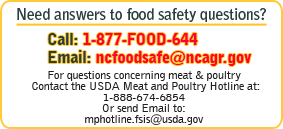

Every year, millions of people may experience one
or more episodes of foodborne illness, without ever
knowing that it was food that caused their illness.
Generally, these illnesses are preventable if safe
food handling practices are followed. Below are some
facts and tips to teach you the basics of food safety.
Make sure that you and your family aren't victims
of preventable foodborne illness!
|
 |
 |
 |
If a food is cooked and put out to serve, make sure
that you keep the food hot if it is not going to be
eaten right away. If you are going to cool the food
in the refrigerator, be sure to cool it quickly in
a shallow container. Perishable food should never
be kept at temperatures between 40°F and 140°F for
more than 2 hours. Bacteria can grow well at these
temperatures and may grow to levels that could cause
illness.
|
| Cold salads, lunchmeats, dairy products
and other foods which require refrigeration should always
be kept cold (below 40°F). If they are allowed to warm
up, bacteria may be able to grow to dangerous levels. |
  |
 |
Our hands naturally carry bacteria on them. If we
transfer that bacteria to food, the food is a good place
for those bacteria to grow! On the other hand, foods
contain a certain amount of bacteria on them as well,
especially raw foods. It is important not to let the
bacteria from raw foods stay on your hands where you
may transfer them to your mouth or other foods. |
| You cook meat and poultry thoroughly to kill the harmful
bacteria that may be on them. That is why it is very
important to make sure that you don't allow the juices
associated with raw meat and poultry to contaminate
other areas of your kitchen. If you do, you may then
allow those bacteria to get onto foods that don't get
cooked before you eat them. |
 |
 |
Frozen raw meat and poultry should never be thawed
by leaving them on the counter at room temperature.
The proper way to thaw such products is to either
thaw them in the refrigerator or thaw them in a microwave
oven. |
| Because fresh fruits and vegetable are grown outside,
they may come in contact with a wide range of bacteria.
Most of these bacteria are harmless, but it is important
to realize that fresh fruits and vegetables should be
washed thoroughly under running water before you consume
them. |
 |
 |
Eggs may contain the bacteria Salmonella in their
yolks, and so it is very important never to leave eggs
at room temperature, or you will allow the Salmonella
to multiply and grow. Because there may be Salmonella
in eggs, you should also always make sure that you cook
your eggs thoroughly before eating them. This means
no runny yellow yolks, and it also means not eating
any cookie or cake batters made with raw eggs! |
| E. coli O157:H7 is a pathogenic bacteria that may
be present in raw ground meat. Because of this it is
important that hamburgers and other ground meat products
be cooked thoroughly to kill this bacteria. Ground beef
must reach an internal temperature of 160°F in order
to ensure that the bacteria E. coli O157:H7 has been
killed. The interior of the meat may turn brown before
this temperature is reached, making it look like the
hamburger is done, but you cannot assure it's safety
until the temperature reaches 160°F. |
 |
 |
Never taste food which you think may be spoiled. If
you are uncertain as to whether or not a food is still
safe to eat, do not eat it. Even reheating foods cannot
destroy the toxins of some bacteria if a food has been
handled incorrectly. Never eat canned food if the can
is bulging or looks like it has had a leak. The consequences
of foodborne illness are not worth the money you will
save trying to salvage the food! |
|
|
The Food and Drug Protection Division conducts routine
inspections of grocery stores, food manufacturers, and warehouses to ensure
a safe food supply for the citizines of North Carolina.
Steve Troxler, Commissioner

.jpg)

